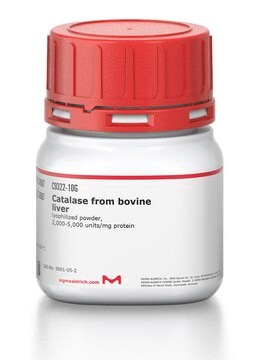10378461001
Roche
Chromozym PL
90%, powder, pkg of 20 mg
Sinónimos:
chromogenic substrate
Iniciar sesiónpara Ver la Fijación de precios por contrato y de la organización
About This Item
UNSPSC Code:
12352204
Productos recomendados
Quality Level
assay
90%
form
powder
packaging
pkg of 20 mg
manufacturer/tradename
Roche
storage temp.
room temp
General description
Chromozym® PL is a chromogenic substrate. It is a synthetic tripeptide substrate and is more plasmin-specific.
Application
Chromozym® PL has been used:
- to determine the plasmin enzymatic activity using human umbilical vein endothelial cells (HUVEC) cell extracts
- as a chromogenic substrate for proteolytic activity in murine lung homogenates
- as a substrate of plasmin in plasminogen activation assays
Quality
Purity: 90% Tosyl-Gly-Pro-Lys-4-nitranilide acetate (enzymatic)
Contaminant: <0.5% free 4-nitraniline
Formula: C26H35N6O7SCOOCH3
Contaminant: <0.5% free 4-nitraniline
Formula: C26H35N6O7SCOOCH3
Sequence
Tosyl-glycyl-polyl-lysine-4-nitranilide-acetate
Physical form
Powder
Preparation Note
Working concentration: Approximately 0.3 to 0.6 mM
Storage conditions (working solution): 2 to 8 °C
A substrate solution (3 mM) is stable for at least two weeks if stored at 2 to 8 °C. Avoid contamination with germs.
Storage conditions (working solution): 2 to 8 °C
A substrate solution (3 mM) is stable for at least two weeks if stored at 2 to 8 °C. Avoid contamination with germs.
Other Notes
For life science research only. Not for use in diagnostic procedures.
Legal Information
Chromozym is a registered trademark of Pentapharm AG, Basel
Storage Class
11 - Combustible Solids
wgk_germany
WGK 2
flash_point_f
Not applicable
flash_point_c
Not applicable
Certificados de análisis (COA)
Busque Certificados de análisis (COA) introduciendo el número de lote del producto. Los números de lote se encuentran en la etiqueta del producto después de las palabras «Lot» o «Batch»
¿Ya tiene este producto?
Encuentre la documentación para los productos que ha comprado recientemente en la Biblioteca de documentos.
Justin G Mathew et al.
Applied bionics and biomechanics, 2017, 9040161-9040161 (2017-07-01)
Vitronectin is a matricellular protein that plays an important role in both coagulation and angiogenesis through its effects on cell adhesion and the plasminogen system. Vitronectin is known to bind to endothelial cells upon integrin activation. However, the effect of
L S Engel et al.
The Journal of biological chemistry, 273(27), 16792-16797 (1998-06-27)
Comparisons of virulence between a Pseudomonas parent strain and an isogenic mutant devoid of protease IV have demonstrated a significant role for this enzyme during infection. We have characterized purified Pseudomonas aeruginosa protease IV in terms of its biochemical and
C Kluft et al.
Blood, 59(6), 1169-1180 (1982-06-01)
This study concerns a case of congenital homozygous deficiency in alpha 2-antiplasmin associated with a severe hemorrhagic diathesis. Heterozygous family members also show a mild bleeding tendency. The propositus is a 17-yr-old male born of white parents and showing a
Li-Jun Ma et al.
Journal of the American Society of Nephrology : JASN, 16(4), 966-976 (2005-02-25)
The potential and possible mechanisms for regression of existing glomerulosclerosis by angiotensin II type 1 receptor antagonist (AT1RA) and/or angiotensin I converting enzyme inhibitor (ACEI) were investigated. Adult male Sprague Dawley rats underwent 5/6 nephrectomy (Nx). Glomerulosclerosis was assessed by
Jessica L Bradshaw et al.
mSphere, 3(3) (2018-05-04)
Pneumonia is a pulmonary disease affecting people of all ages and is consistently a leading cause of childhood mortality and adult hospitalizations. Streptococcus pneumoniae and Pseudomonas aeruginosa are major lung pathogens commonly associated with community-acquired and nosocomial pneumonia. Additionally, mixed
Nuestro equipo de científicos tiene experiencia en todas las áreas de investigación: Ciencias de la vida, Ciencia de los materiales, Síntesis química, Cromatografía, Analítica y muchas otras.
Póngase en contacto con el Servicio técnico